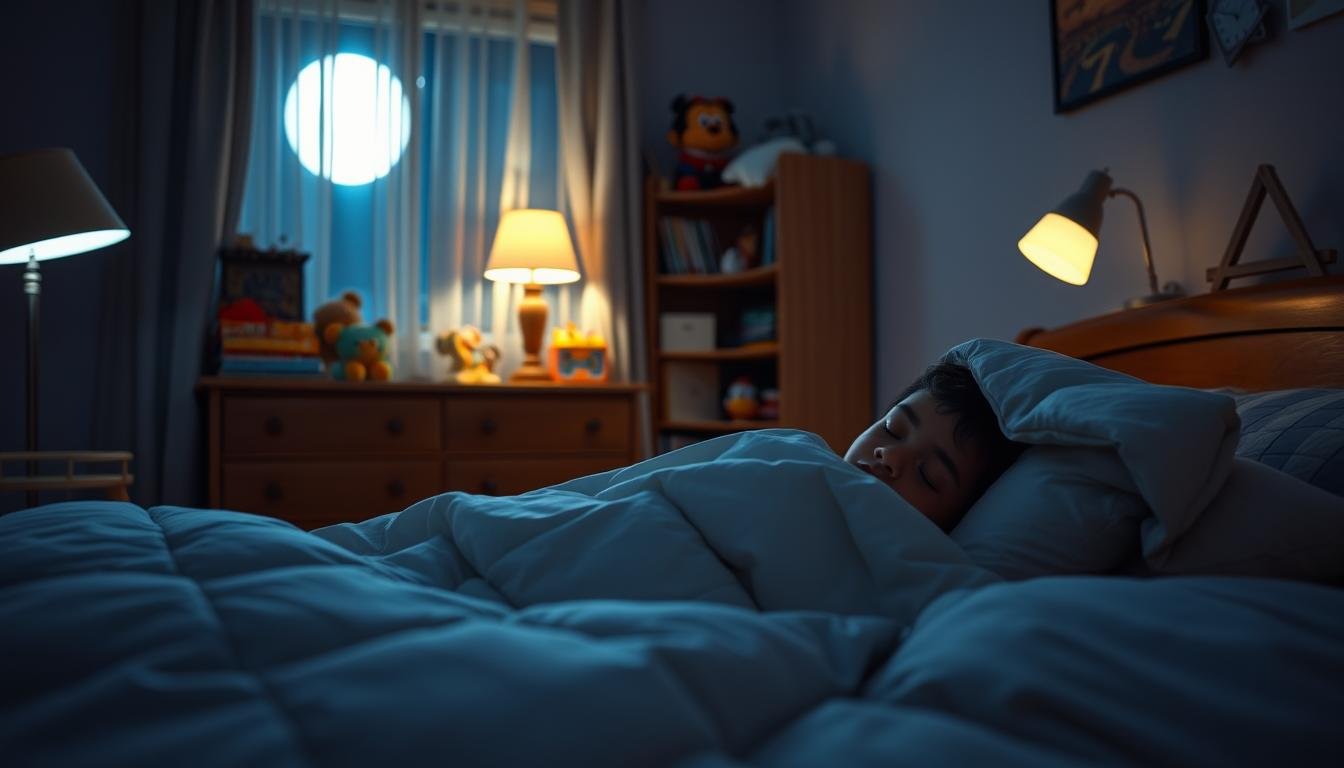Have you thought about how bedtime rituals impact our kids’ days? The nighttime whispers, lullabies, and the dance of nightlights do more than end the day. They lay the groundwork for our children’s wellbeing in the sunlight. In homes everywhere, we talk about how our kids sleep. These conversations show our wish to blend empathy with knowledge.
It’s tough when kids resist bedtime. They’re not ready to end their day of fun. Trying to get them to sleep can feel like a storm. We deal with tantrums and mood swings in the dark. Our job is to guide them, securing their emotional and mental growth with bedtime stories and routines.
Challenges at night show their growth and need for guidance. They’re not opposing us. They communicate through protests at bedtime, showing they need our help. We offer them stability, much like stars guide sailors at night.
Responding to their requests for “one more story” with patience teaches them. Good sleep means better focus, joy, and health. We must meet their discomfort with understanding. Sometimes, being kind means ensuring they get the sleep they need.
Kids need nine to 10 hours of sleep for their growth. The importance of sleep extends beyond simple numbers. Setting consistent bedtime routines helps sync our children’s internal clocks. Less screen time and quiet evenings plant seeds for future happiness. Adequate sleep is crucial for kids under five, protecting them from daily stress. Let’s ensure no child is deprived of the rest they need because of busy schedules or gadgets.
Understanding the Critical Role of Sleep in Child Development
We often talk about the need for good food and education in child growth. But how much do we think about sleep? It’s not just about getting enough rest. It’s crucial for kids brain development, thinking skills, feelings, and health in kids. Let’s look into why sleep is so important for children as they grow.
For newborns, 14-17 hours of sleep is essential for quick brain growth and health. As babies grow, they need a bit less sleep but it’s still very important. It helps their thinking and feelings. The amount of sleep kids need changes as they get older. This is due to changes in their body clocks.
Studies show not sleeping enough can lead to less grey matter in areas linked to attention and memory. This shows how vital sleep is for keeping the brain healthy. Sleep problems like insomnia or sleep apnea can also impact a child’s brain health and growth.
| Age Group | Recommended Sleep | Common Sleep Challenges |
|---|---|---|
| Newborns (0-3 months) | 14-17 hours | Adjustment to sleep cycles |
| Infants (4-11 months) | 12-15 hours | Teething, separation anxiety |
| Toddlers (1-3 years) | 11-14 hours | Transition from naps, sleep regression |
| Preschool (3-5 years) | 10-13 hours | Night terrors, resistance to bedtime |
| School-aged (6-13 years) | 9-11 hours | Influence of technology use, homework |
| Teenagers (14-17 years) | 8-10 hours | Biological sleep phase delay, social pressures |
As children get older, they need less sleep. But the quality of sleep is still key. Teenagers face a big challenge. Their sleep cycles change, but they often have to wake up early. Tackling this issue helps protect their future health. It can prevent obesity, diabetes, and mental health problems.
We should think more about how sleep affects children’s growth. By helping kids sleep better and dealing with sleep problems early, we support their overall development. This ensures they not only grow but also do well in life.
Parental Perceptions and Child Sleep Challenges
How we view our kids’ bedtime behavior impacts sleep training and independence. Bedtime resistance is common and stressful for parents. Yet, seeing this behavior as a normal part of growing up can change our approach.
Research, like the one using the Pittsburgh sleep quality index (PSQI), shows parent views on sleep can shape how they tackle sleep problems. This view is influenced by both the child’s sleep actions and the parents’ own sleep quality. For example, parents who sleep poorly might think their kids wake up more at night. This can start a cycle that disrupts sleep for everyone.
Understanding sleep’s parent-child dynamics is key. It’s not just about sleep training; it’s also about empathy. Knowing this makes us see sleep independence as a skill kids can learn, with our support and without stress.
It’s essential to get the details right. For instance, studies found parents say bedtime is at 8 PM, and kids wake up at 6:45 AM. This schedule not only meets a child’s sleep needs but also shows how vital consistency is. A regular routine helps in reducing bedtime issues.
Creating a supportive bedtime environment boosts children’s confidence and growth. It lessens our anxiety, improving sleep for kids and parents alike. This makes the whole family sleep better. So, tackling sleep challenges isn’t just about strategies. It’s also about changing how we see things. By shifting our views, we can better our children’s sleep and our night-time interactions with them.
Mental and Behavioral Health: The Sleep Connection Revealed by Research
Quality sleep is key for children’s mental health. Studies show lack of sleep can cause learning problems and impulsivity. It helps to understand these links to better support our kids.
Kids not getting enough sleep often have worse behavior problems. They might struggle with mood, stress, and learning. Poor sleep starts a cycle of stress and behavior issues, reducing sleep quality even more.
- Sleep-deprived pre-teens have different brain structures, mood, and thinking problems.
- Kids with less sleep have less grey matter in key brain areas.
- Lack of sleep can increase impulsivity, stress, and aggression, harming mental health.
But the problem doesn’t stop there. Continued research shows long-term effects. Not enough sleep early on links to weaker language and learning later. Even babies with bad sleep might face delays and lower cognitive scores.
These findings show sleep’s big role in kids’ mental and emotional health. We, as caregivers and educators, can make a big difference. Encouraging good sleep can reduce mental and behavioral issues in children.
Finally, remember the American Academy of Sleep Medicine’s sleep tips. Teenagers need 8-10 hours of sleep. Younger kids need more, depending on their age. Following these rules is vital for our children’s health and well-being.
Key Indicators Your Child May Be Sleep-Deprived
Keeping an eye on our children’s growth includes watching for signs of sleep deprivation. Spotting these signs early aids in preventing negative effects on their mood, behavior, and brain power. This discussion points out key behavioral signals and emphasizes swift action.
If your child’s mood changes more than usual, they might not be sleeping well. Also, if they have trouble focusing on homework or lose interest in favorite activities, it might be a sleep issue. These are early signs of sleep deprivation in kids.
Physical symptoms like trouble getting up or feeling sleepy during the day are worrying. These aren’t just about being tired. They might point to serious sleep problems that need a doctor’s attention. You may need to see a sleep specialist.
| Age Group | Hours of Sleep Needed | Common Sleep Issues |
|---|---|---|
| Newborns (0-2 months) | 16-20 hours | Breathing disorders |
| Infants (3-12 months) | 9-12 hours | Irregular sleeping patterns |
| Toddlers (1-3 years) | 12-13 hours | Difficulty with naps |
| Preschoolers (3-5 years) | 11-12 hours | Nightmares, sleepwalking |
| School-aged (6-12 years) | 10-11 hours | Snoring, resistance to bedtime |
| Teenagers (13-18 years) | 9-9.5 hours | Insomnia, disrupted sleep due to anxiety |
Aside from physical and behavioral signals, poor grades can also indicate not enough sleep. Lack of sleep affects memory, problem-solving skills, and overall learning, lowering school performance.
Remember, good sleep is key for health, like diet and exercise. Turning off screens before bed and relaxing can help sleep better. Making sure our children sleep enough prepares them for life’s daily hurdles.
Strategies for Promoting Quality Sleep for Kids
Sleep is crucial for a child’s well-being. In this article, we’ll talk about ways to improve your child’s sleep. We cover bedtime routines, electronic use before bed, how to deal with stress, and keeping a regular sleep schedule.
- It’s key to have consistent sleeping schedules. Kids and teenagers do well with routine. They need about 9-12 hours of sleep, while teenagers need 8-10 hours. Even during weekends, try to not change their sleep times by more than an hour.
- Start bedtime routines 20-30 minutes before sleep. This could be reading or talking calmly. Doing these things every night helps your child get ready for bed.
- Reduce electronic use before sleep. Turn off screens an hour before bed. The light from devices can make it hard for them to fall asleep.
- Use stress management for children. Talk about their day and teach them ways to relax, like deep breathing. This can make bedtime less stressful.
- Having a sleep-friendly space is important. The room should be dark, cool, and quiet. Use blackout curtains and consider a white noise machine if needed. Keep the room around 65 degrees.
- Physical activity is also key. Make sure your child is active for at least an hour each day. This helps them sleep better. But, avoid exercise right before bed.
To manage sleep problems, avoid scary shows before bed and cut back on caffeine. Caffeine is in more than just coffee and can keep them awake.
If you’ve tried everything and problems remain, it might be time to see a doctor. As per health experts, professional advice can be very helpful.
These steps can lead to better sleep, which improves health and happiness. By following these tips, you can help your child sleep better. This also strengthens your bond by being a part of their sleep routine.
Conclusion
Wrapping up our talk on kids’ sleep habits, we see it’s more than a luxury. It’s key for their behavior and growth. Parents should add sleep guidance to daily routines. Kids 5 to 12 need 9 to 12 hours of sleep. Sadly, many don’t get enough, affecting their mood and health.
To help, we should set a regular bedtime and turn off screens early. Also, a calming night routine is good. These steps help kids sleep better. The SleepFoundation.org shows why good sleep is vital. It supports kids’ mental and emotional health. Providing a calm sleeping area helps too, as each age needs different sleep amounts.
Improving sleep habits is a team effort. Visiting Kids Miracle Steps offers great resources. Working together, we help our children thrive. We also strengthen our community ties by sharing our successes and struggles.






